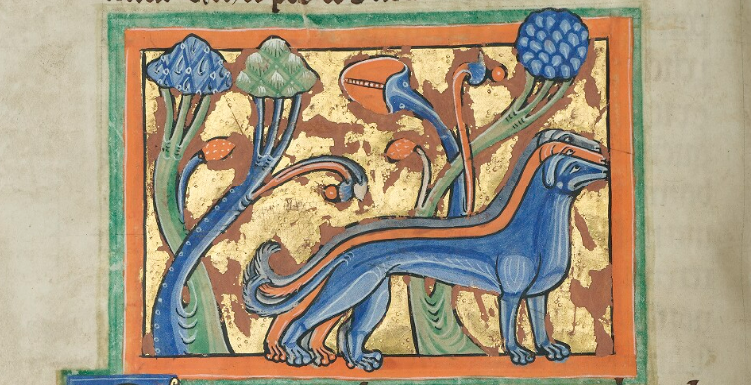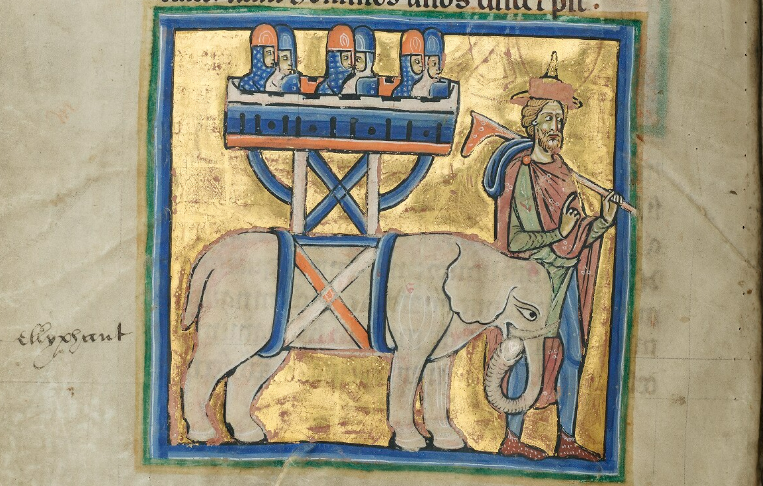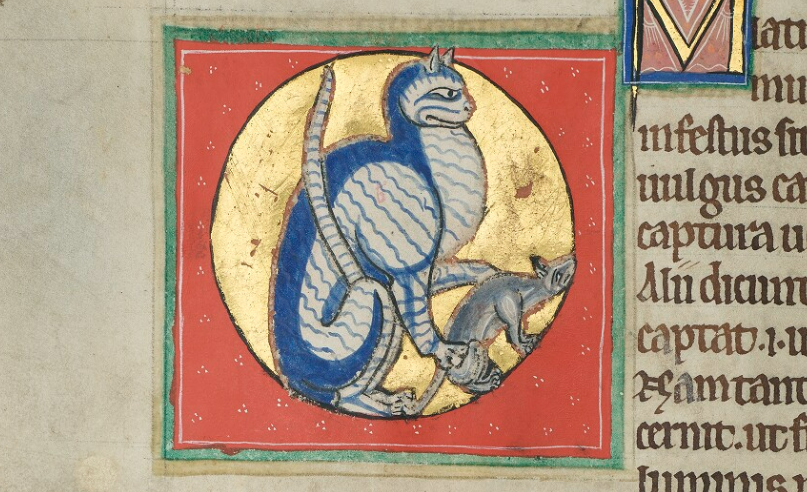Here we are at the very end of term! It’s been, as always, a delight to be your guide for these past 8 weeks. Thank you for all of your wonderful seminars, reading groups, and blog posts! In the words of Anselm, couresy of the Epistolae project:
os et stilus ad proferendum quod cor sentit non sufficit
[mouth and pen are not capable of expressing what my heart feels.]
A letter (1104) from Anselm, archbishop of Canterbury to Matilda of Tuscany
Our blog post this week is a real delight: Dr Laura Varnam blogs about writing a collection of poems for the women of Beowulf. In Dr Varnam’s words, ‘My project asks, what might happen if we imagined a female poet or scop reciting Beowulf?’. The blog post explains Dr Varnam’s rationale for the project, and also features extracts from the collection. What better way to end the term than new ways to think about old poems? To read the fantastic blog post (and poems!) please click here.
We have a full week of exciting events in store for you: not least the termly OMS Lecture! Please join us on Tuesday for Peregrine Horden’s lecture on ‘Healthy Crusading in the Age of Frederick II: the puzzle of Adam of Cremona‘: poster attached to this week’s email!
ANNOUNCEMENTS:
- Are you interested in the history of the Turin Shroud? It will feature in Barbara Haggh’s seminar next Thursday (online), with lively discussion from the invited respondents – as well as from any knowledgeable attendees: registration link.
- Save the date: ‘Historical research in the time of the Anthropocene: can climate data help us read the past (and, if so, how)?’ with Prof Nicola Di Cosmo will take place on May 8th, 5:00pm – 6:15pm. Registration Required To register and for more details.
EVENTS THIS WEEK:
Monday 4th March:
- The Medieval French Palaeography Reading Group meets at 10.30-12 in the Weston Library. This group is open to anyone with an interest in Old French, Middle French and Anglo-Norman manuscripts. We study and read manuscripts from the 12th century to the late 15th century. If you are interested in joining the group or would like more information, please write to: Laure Miolo
- The final session of the Seminar in palaeography and manuscript studies, Hilary Term 2024 takes place today: Sara Norja (Turku) – ‘Exploring alchemical manuscripts’ Weston Library, Horton Room, 2:15-3.45pm.
- The Medieval Archaeology Seminar meets at 3pm in the Institute of Archaeology, Lecture Room. This week’s speaker will be Karen Dempsey (Cardiff University), Special deposits in medieval households.
- The Medieval History Seminar meets at 5pm in the Wharton Room, All Souls College. This week’s speaker will be Alison Beach (St Andrews), ‘From Text to Teeth: Embodied Stories of Premodern Women at Work’. The seminar will also be available via Teams: The Teams session can be accessed by logging in to Teams with your .ox.ac.uk account and joining the group “Medieval History Research Seminar” (team code rmppucs). Alternatively, it can be accessed via this link. If you have any difficulties please email: medhistsem@history.ox.ac.uk
- The International Interfaith Reading Group on Manuscripts in Interfaith Contexts will meet at 6pm, online via Zoom. This week will be led by Professor Lawrence H. Schiffman, Global Distinguished Professor of Hebrew and Judaic Studies at the Skirball Department of Hebrew and Judaic Studies, New York University, USA. Prof. Schiffman will be speaking on ‘The Dead Sea Scrolls and Jewish-Christian Dialogue’. To register, please click here.
- The Old Norse Reading Group meets at 5.30-7pm. We’ll be translating a range of exciting Old Norse texts! To join the mailing list, email Ashley Castelino.
Tuesday 5th March:
- The Europe in the Later Middle Ages Seminar meets at 2-3.30pm in the Dolphin Seminar Room, St John’s College. Tea and coffee available from 1.45pm. Undergraduates welcome. This week’s speaker will be Sophie Charron, Oxford, ‘Queens and Popes in the Later Middle Ages: Bohemian Case Studies‘.
- A special seminar, ‘The Medieval Library’ with Professor Teresa Webber, Trinity College, Cambridge, will take place at 2.30-4.30pm at the Sir Victor Blank Lecture Theatre, Weston Library. This seminar explores the codicological and documentary evidence for reconstructing the contents and organisation of the libraries of ecclesiastical and academic institutions in the Middle Ages.
- The Oxford Centre for Hebrew and Jewish Studies Online Conference has a session of interest to medievalists taking place at 2.30-3.45pm, online. The speakers will be Dean Irwin, University of Lincoln, “England Remembers, Jews Forget: Memory of Jews and England, 1290-1541”; Rory MacLellan, British Library, “Converts at the Royal Court in the 14th and 15th centuries”; and Cynthia Rogers, Ackerman Center for Holocaust Studies, Univ Texas, “Crypto Jews and Jewish Heritage in England: The Ames Family”.
- The Old High German Reading Group will meet at 4pm in the Committee Room, 41 Wellington Square. If there is appetite amongst attendees, the group will migrate to the Lamb and Flag after the session. Handouts will be provided and no prior knowledge is required! This term the texts—with a different theme for each session—will be chosen from different sections of the Althochdeutsches Lesebuch (Braune 1994), alternating between verse and prose. This week will be Old Saxon (prose), Altsächsische Beichte (Braune XXII.5) – “Old Saxon Confession”.
- The Oxford Medieval Studies Hilary Term Lecture, Co-hosted by the Medieval Church and Culture Seminar meets at Wellbeloved Room, Harris Manchester College. Tea & coffee from 5pm; lecture begins 5.15pm. This term’s lecture is Peregrine Horden (All Souls), ‘Healthy Crusading in the Age of Frederick II: the puzzle of Adam of Cremona‘. Everyone is welcome and there will drinks afterwards!
Wednesday 6th March:
- The Medieval German Seminar meets at 11.15, at St Edmund Hall, Principal’s Lodgings. Luise Morawetz will present the findings of her recently completed dissertation on the Old High German glosses of the Murbach Hymns. Further information and reading recommendations via the teams channel; if you want to be added to that: please email Henrike Lähnemann.
- The Medieval Latin Document Reading Group meets at 4-5pm on Teams. A document is sent out in advance but homework is not expected. Please contact Michael Stansfield for further details and the Teams link.
- The Late Antique and Byzantine Seminar meets at 5pm at The Ioannou Centre for Classical and Byzantine Studies 66 St Giles and online via Microsoft Teams by clicking here. This week’s speaker will be Petros Bouras-Vallianatos (National & Kapodistrian University of Athens) – ‘Byzantine Medicine in Light of the Global Middle Ages: Current Trends and Future Avenues’.
- Dante Reading Group meets at 5.30-7pm in St Anne’s College, Seminar Room 11. Each week, we will be reading through and discussing a canto of the Divine Comedy in a relaxed and informal setting, delving into Dante’s language and imagination in manageable chunks. The group is open to those with or without a knowledge of Italian, the reading being sent out in the original and in translation. Refreshments, both alcoholic and otherwise, will be provided! To register or ask any questions, please email charles.west@regents.ox.ac.uk (Sponsored by TORCH).
Thursday 7th March:
- The Ethics of Textual Criticism Seminar meets at 10am at Harris Lecture Theatre, Oriel College. This week’s speaker will be Carmen Cardelle de Hartmann (Zürich), ‘Marginalised authors, anonymous texts: the problems of attribution in medieval Latin‘.
- The Middle Welsh Reading Group meets at 2-4pm in Jesus College, Seminar Room A. No previous knowledge of Middle Welsh is assumed. Translations will be provided with plenty of time to ask questions at the end. We’ll read a selection of early and late Middle Welsh prose and poetry to offer everyone a chance to experience the richness of Middle Welsh and its literary tradition. Please email to register your interest so that Svetlana knows how many people to expect: svetlana.osiochfhradhapresern@jesus.ox.ac.uk.
- The Late Roman Seminar will meet at 4pm in the Seminar Room, Corpus Christi College. This week’s speaker will be Yaniv Fox (Bar-Ilan), ‘The Symbolic Worlds of Justus of Urgell and Gregory the Great’.
- The Eastern Christianity in Interfaith Contexts Reading Group will meet at 5-6pm, online via Zoom. This week will be led by Professor Febe Armanious, Professor of History at Middlebury College, USA. Prof. Armanious will be speaking on ‘The Miracle of Pilgrimage: A Coptic Journey to the Holy Land During the Ottoman Period’. To register, please click here.
- The Seminar in Medieval and Renaissance Music meets at 5pm via Zoom. If you are planning to attend a seminar this term, please register using this form. For each seminar, those who have registered will receive an email with the Zoom invitation and any further materials a couple of days before the seminar. If you have questions, please just send an email to all.souls.music.seminars@gmail.com. This week’s presenter will be Barbara Haggh-Huglo (University of Maryland at College Park), ‘Guillaume Du Fay between the Church and Two Courts: A Reassessment of his Biography’, and the discussants will be Anne Walters Robertson (University of Chicago) and Reinhard Strohm (University of Oxford).
- The Lincoln Unlocked & Oxford Bibliographical Society Lecture takes place at 5.15pm in the Oakeshott Room, Lincoln College. Georgi Parpulov will be speaking on Lincoln College’s Greek Manuscripts. We will also be streaming the talk on Zoom; if you would like the link, please contact Sarah on sarah.cusk@lincoln.ox.ac.uk.
- The Celtic Seminar meets at 5pm, online via Zoom. Please contact a.elias@wales.ac.uk for the link. This week’s speaker will be E. Wyn James, ‘Watford: man cyfarfod radicaliaethau rhyngwladol’.
- The Medieval Women’s Writing Reading Group meets at 5-6.30pm in Lincoln College Lower Lecture Room. This week’s reading will be Female Poets in Al-Andalus. Stay up to date with events by joining our mailing list or following us on X @MedievalWomenOx. Texts for the reading group are shared on the mailing list.
Friday 8th March:
- The Medieval Coffee Morning meets as usual 10:30am in the Visiting Scholars Centre of the Weston Library (instructions how to find it) with presentation of items from the special collections, coffee and the chance to see the view from the 5th floor terrace. This week there will be a special display for International Women’s Day!
- The Late Antique Latin Reading Group meets at 12-1pm, in the Hovenden Room, All Souls College, and is open to anyone engaged in research on the late antique world. Though prior knowledge of Latin is required, we welcome people with a range of abilities. We particularly welcome graduate students and early career academics. If you would like to attend, or you have any questions, feel free to contact either of the convenors. Please do RSVP if you intend to attend, so that we can gauge numbers and circulate the readings. Contact: David Addison (david.addison@all-souls.ox.ac.uk) and Alison John (alison.john@all-souls.ox.ac.uk).
- Exploring Medieval Oxford through Lincoln Archives meets at 2-3pm, in Seminar Room 2, EPA Centre, Museum Road. Anyone interested in analyzing primary sources and conducting a comprehensive examination of the documents are welcome to attend. Those who are interested can contact Lindsay McCormack and Laure Miolo via email: Lindsay Mccormack and Laure Miolo
- The Tolkien 50th Anniversary Seminar Series meets at 4-5pm in Corpus Christi College Auditorium. This week’s speaker will be Anine Englund (University of Oxford)
“In the halls of Mandos”: Death, Deathlessness and Inter-Racial Relations in Beren and Lúthien. Free access (no need to book).
Finally, some wisdom for us all as we set off on research trips, conferences, and visits to family for the Easter vac:
Multae sunt aquarum congregationes inter me et te, tamen caritate iungamur quia vera caritas numquam locorum limite frangitur.
[Many are the congregations of water between me and you, yet let us be joined in love because true love is never divided by the borders between places.]
A letter (770s) from Berhtgyth to Balthard
Whether you’re staying in Oxford or going away over the congregations of water, know that OMS will be here waiting for you when you return. For those visiting scholars who are leaving us after this term: thank you for being part of our community, and please know that you always have a place at Oxford, whose love for the medieval is never divided by the borders between places!

St John’s College MS. 61, f. 23 v.
By permission of the President and Fellows of St John’s College, Oxford
Viewable in full at Digital Bodleian


















